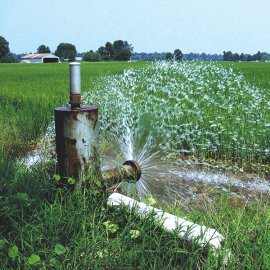Irrigation Efficiency Paradox
-
English
-
ListenPause
[intro music]
Welcome to World Ocean Radio…
I’m Peter Neill, Director of the World Ocean Observatory.
According to the US Geological Survey, some 70% of the available freshwater worldwide is used for irrigation. I find this astonishing. That the remaining 30% accumulated in the aquifers, lakes and rivers, wells and annual rainfall, that is the volume by which our drinking water, sanitation, manufacturing needs are met. And this supply is further diminished by pollution and changing climate conditions, fire, drought, erosion, and mis-management. It is no wonder that our cities around the world are critically short of water for basic public health, that refugees are moving in search of water-rich opportunity, that the commodification of water continues in order to monetize and profit from diminished supply and increased demand, and that we are beginning to understand the threat of water as a cause for instability and conflict.
Irrigation has been required to aid horticulture since the beginning of time. I was once witness in China of a farmer with a hillside field, each plant surrounded by mounded earth, using a bullock turning a mechanism to lift buckets of water from a well to empty one at a time to allow that water to run downhill, to saturate the rows until the very last plant was fed enough, no less, no more than what was needed that day. It was ingenious and effective, perfectly tuned to the requirement, not a drop of water wasted.
Industrial agriculture changed all that, and set into motion patterns of use that have today brought us to a global water crisis. Key to this phenomenon was irrigation, taken from underground and freshwater places to supply a technology, pivot point irrigation, that enabled such modern-day miracles as Israel, a nation formed from the desert using water from the Jordan River, or the California farms and orchards fed by dams and reservoirs and conduits to collect and distribute to places where things could not grow. India and China have gone so far as to design dramatic new national water distribution systems that have reshaped the natural landscape, displaced communities, increased water availability, until today, when with drought and extreme weather, what appears to have been a transcendent plan has turned into a negative reality, calamitous and ineffective.
At the heart of this situation is what has been called the “irrigation efficiency paradox.” The differential between the actual water used by crops with the total volume of water applied to the field. The gap is measured by water that percolates into the land below its intended use, or evaporates with ever-increasing temperatures, or simply runs off as excess water somewhere else in the natural water system of the region, what could be a return or recycling outcome of whatever is not effectively used. Farmers could actually reduce their initial consumption by the run-off amount, maintain the efficiency of maximum growth, or they could divert that excess to other fields, doubling down on the area irrigated by the water consumed.
Should they choose to do so. But they don’t.
Water policy, local and state regulations, and quotas invented for equitable distribution have not kept up with the changing conditions. I once visited a farm in eastern Oregon, owned by a Portland lawyer, and during lunch I suddenly heard the sound of a torrential water release. It was his quota distribution that passed through his property as a deluge irrigating nothing. He explained that if he did not use his full quota, he would lose it according to water association rules. The water passed on into downstream of the river from which it was first taken, providing no use to him, but at least retained to provide some use to someone else.
Incentives have been devised to pay farmers to increase irrigation efficiency and reduce consumption. Modifications to quotas, reduction of water available to farmers has been attempted, but therein lies the paradox. The solution to the problem benefits one user over another, moderates irrigation supply, but provides downstream value to cities or other users who are confronted with having no water at all.
What are the solutions? If farmers will not change their areas farmed, crops grown, and quota demands, the decline seems inevitable: less water as predicted, no reduced demand, declining revenues, community disruption, and the providing resources consumed by paradox and intransigence and reduced to a trickle, with no water left to drink.
Remember, this describes 70% of the freshwater use worldwide. What happens when the water cycle fails because we won’t change our water-wasting ways? And when those dry rivers meet the sea, what then? How will that outcome affect our coasts and oceans? How will we live, upland and down, without water?
We will discuss these issues, and more, in future editions of World Ocean Radio.
[outro music]
According to the US Geological Survey, 70% of the available freshwater worldwide is used for irrigation. Industrial agriculture and modern irrigation practices have today brought us to a global water crisis. This week we're discussing what has been called the “irrigation efficiency paradox,” when farmers use more water, even as they are becoming more efficient in their irrigation practices. What will happen when the water cycle fails because we won’t change our water wasting ways?
About World Ocean Radio
Peter Neill, Director of the World Ocean Observatory and host of World Ocean Radio, provides coverage of a broad spectrum of ocean issues from science and education to advocacy and exemplary projects. World Ocean Radio, a project of the World Ocean Observatory, is a weekly series of five-minute audio essays available for syndicated use at no cost by college and community radio stations worldwide.
World Ocean Radio is produced in association with WERU-FM in Blue Hill, Maine and is distributed by the Public Radio Exchange and the Pacifica Network.
Available for podcast download wherever you listen to your favorites.
Image
Irrigation groundwater well
USGS.gov
Public domain
- Login to post comments



